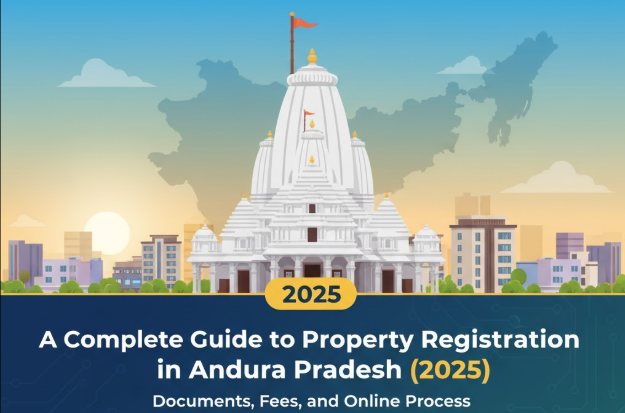The moment you find the perfect property in Andhra Pradesh is exhilarating. Whether it’s a dream home for your family in Vijayawada, a strategic commercial space in Visakhapatnam, or a peaceful plot of land in the countryside, it represents a significant milestone and the culmination of years of hard work. But between that moment of decision and legally calling the property your own lies a complex maze of paperwork, legal scrutiny, fees, and procedures.
For many, this process is daunting, filled with confusing terms like ‘stamp duty,’ ‘sale deed,’ ‘market value,’ and ‘encumbrance certificates.’ The path is rarely straightforward, and mistakes made during property registration can be incredibly costly. They can lead to vicious legal disputes, significant financial loss, and complications that can haunt you for years, turning your dream investment into a source of endless stress.
This definitive 2025 guide is here to demystify the entire property registration process in Andhra Pradesh. We will provide you with a detailed, step-by-step checklist, a clear breakdown of all associated costs, and the expert knowledge needed to navigate the system. Our goal is to empower you to secure your valuable investment with confidence and complete peace of mind.
Why Proper Property Registration is Non-Negotiable in Andhra Pradesh
Before diving into the “how,” it’s crucial to understand the “why.” Property registration is not just another bureaucratic formality; it is the absolute bedrock of property ownership in India. Under the Indian Registration Act, 1908, it is mandatory to register any transaction involving the sale of immovable property. Here’s a deeper look at why this is absolutely essential:
- It Grants Absolute Legal Ownership: An unregistered property agreement gives you, at best, a precarious possession. A registered sale deed, however, grants you a legal, marketable title. It is the ultimate proof that the ownership has officially and irrevocably been transferred to you, making you the undisputed owner in the eyes of the law and the world.
- It Acts as a Powerful Shield Against Fraud: Property fraud is a devastating reality. Proper registration in the government’s public records provides a transparent notice of your ownership. This significantly reduces the risk of the previous owner illegally re-selling the property, or third parties making fraudulent claims on it in the future.
- It’s Essential for Financial Leverage: Your property is a powerful financial asset. If you ever plan to secure a bank loan for business, education, or a medical emergency using your property as collateral (a mortgage), financial institutions will absolutely require the original registered documents as conclusive proof of your clear and unencumbered ownership.
- It Ensures Accurate Government and Civic Records: When your property is registered, its details are updated in crucial state and local land records, such as Meebhoomi and Adangal. This is critical not just for property tax assessment but also for obtaining utility connections (electricity, water, gas) in your name and for any future dealings with municipal authorities.
Before You Begin: A Pre-Registration Due Diligence Checklist
A smooth registration process begins long before you even think about visiting the Sub-Registrar’s Office (SRO). Conducting thorough due diligence is the most critical step you can take to prevent future complications and safeguard your investment.
1. Comprehensive Title Verification and Tracing
This is the most crucial step. You must ensure the seller has a clear, absolute, and marketable title to the property. This goes beyond just looking at the current sale deed. It involves:
- Tracing the “Mother Deed”: You need to trace the property’s ownership back to its origin or for at least the last 30 years. This involves examining the “Mother Deed” or “Parent Document” and all subsequent “link documents” to ensure an unbroken and logical chain of ownership.
- Checking for Litigation: A lawyer can help you check court records to ensure the property is not embroiled in any ongoing legal disputes or litigation that could affect your ownership.
2. Obtain and Scrutinize the Encumbrance Certificate (EC)
An Encumbrance Certificate is a vital document that reveals whether the property is free from any monetary or legal liabilities, such as an existing mortgage, a lien, or a court-ordered attachment. It’s standard practice to obtain an EC for the last 30 years.
- Form 15: If there have been transactions, the EC will be issued as Form 15, detailing each transaction.
- Form 16: If there have been no transactions in the period, a Nil Encumbrance Certificate will be issued as Form 16.
3. Verify Property Tax and Utility Status
You must verify that all property taxes, water bills, electricity bills, and any other municipal or society dues have been fully paid by the seller up to the date of sale. Request original receipts. Any outstanding dues will become your liability after the purchase.
4. Scrutinize Land Use Zone and Building Approvals
This is especially critical when buying a plot or a newly constructed apartment.
- Master Plan: Check the local authority’s (e.g., VMC, GVMC, TUDA) Master Plan to confirm the property’s zoning classification is residential/commercial as claimed.
- Building Plan Approval: Ensure the building has been constructed according to a plan approved by the relevant municipal body. Ask for the approved building plan and check for any deviations, as they can lead to penalties or even demolition orders.
The Step-by-Step Property Registration Process in AP (The 2025 Guide)
Once your due diligence is complete and your lawyer has given the green light, you can proceed with the official registration process.
Step 1: Meticulous Drafting of the Sale Deed
The Sale Deed (or Conveyance Deed) is the primary legal instrument that creates rights and transfers ownership. This is not a document to be taken lightly or copied from a template. It must be meticulously drafted by a legal expert and should include, at a minimum:
- Full details of the buyer and seller (name, age, address, PAN).
- A complete and unambiguous description of the property, including its schedule, location, size, and boundaries.
- The final agreed-upon sale value (consideration amount).
- A clause confirming the seller has a clear title and that the property is free from all encumbrances.
- Terms and conditions of the sale, payment details, and the date of handing over peaceful possession.
- Indemnity clauses to legally protect the buyer from any future claims or defects in the seller’s title.
Step 2: Calculating and Paying Stamp Duty and Registration Fees
Before registration, you must pay the applicable stamp duty and registration fees.
- How it’s Calculated: The fee is calculated based on the property’s “Market Value” (also known as guideline value or circle rate) or the actual sale value mentioned in the deed, whichever is higher. The market value is the minimum value fixed by the government for a specific area.
- Payment Process: In Andhra Pradesh, this process is streamlined online through the IGRS AP portal. You can calculate the exact amount and make the payment via methods like e-stamping (e-challan). As of 2025, it’s crucial to check the IGRS AP website for the latest fee percentages as they are subject to change.
Step 3: Booking a Slot at the Sub-Registrar’s Office (SRO)
After successfully paying the fees, you must book a time slot for the physical registration at the SRO that has jurisdiction over the property’s location. This is also done online via the IGRS AP portal. This system helps manage crowd flow and ensures a more efficient process.
Step 4: Executing the Document at the SRO
On the appointed date and time, the buyer, seller, and two witnesses must be present at the SRO. You must carry all original documents, proof of payment of stamp duty, and valid identity proofs. In the presence of the Sub-Registrar, all parties will sign or place their thumb impression on the Sale Deed.
Step 5: Biometrics, Photos, and Verification
The photographs and fingerprints (biometrics) of the buyer, seller, and witnesses will be officially captured and affixed to the legal documents. The Sub-Registrar will then thoroughly verify all the documents against the government’s records and ensure all details are correct.
Step 6: Receiving the Registered Documents
Once the Sub-Registrar is fully satisfied with the authenticity of the transaction and the documents, they will officially register the document. A unique registration number is assigned, and the document is scanned into the government’s digital records. The original, registered Sale Deed, now a legally binding public record, can usually be collected from the SRO after a few days.
Document Checklist: Everything You Need for Registration
Be prepared with the following documents (both original and at least two sets of photocopies):
- Final Drafted Sale Deed
- Original Title Deed of the seller and the complete chain of preceding “link documents”
- Encumbrance Certificate (EC) for the last 30 years
- Latest Property Tax Payment Receipt
- Identity Proof of the Buyer, Seller, and Witnesses (Aadhaar Card is preferred)
- PAN Card of both the Buyer and Seller (mandatory for property transactions over ₹5 lakhs). Additionally, be aware of TDS obligations under Section 194-IA of the Income Tax Act for properties valued over ₹50 lakhs.
- Map or Survey Plan of the property clearly showing its boundaries.
- Proof of Payment for Stamp Duty and Registration Fees (e-challan).
- NOC (No Objection Certificate), if applicable (e.g., from a society or in case of agricultural land).
The Role of a Property Lawyer: Your Shield Against Costly Mistakes
While you can technically navigate this process yourself, the legal and financial stakes are incredibly high. Engaging a property lawyer is not an expense; it’s a critical investment in security and peace of mind.
Comprehensive Legal Due Diligence
A lawyer conducts a professional title search, scrutinizes decades of documents, and understands the legal nuances in a way that an untrained eye cannot. They are trained to spot red flags that could signify future disputes.
Ironclad Document Drafting
Using a standard, one-size-fits-all template for a Sale Deed is a recipe for disaster. A lawyer drafts a document tailored specifically to your transaction, including strong protective clauses that safeguard your interests against any eventuality.
Seamless Representation and Process Management
Your lawyer can manage the entire process, from due diligence and liaising with government departments to representing you at the SRO, ensuring all legal formalities are completed correctly, efficiently, and without any hitches.
Post-Registration Formalities (Mutation)
After registration, the work isn’t over. The property’s title must be updated in the local municipal or revenue records in your name. This process is called Mutation. A lawyer ensures this is done promptly so that future property tax bills are generated in your name.
Frequently Asked Questions (FAQ)
Q1: How much does it cost to register a property in AP?
As of early 2025, the total cost typically includes a stamp duty of around 5-6% and a registration fee of 1% of the property’s market value. However, these rates are subject to revision by the government. Always verify the latest percentages on the official IGRS AP portal before making payments.
Q2: What is the difference between a Sale Agreement and a Sale Deed?
A Sale Agreement (or Agreement to Sell) is a preliminary contract that outlines the terms and conditions agreed upon by the buyer and seller. It shows an intention to sell/buy in the future. A Sale Deed is the final, binding legal document that actually transfers ownership of the property. The Sale Deed is the document that gets registered.
Q3: What happens if I lose my original registered sale deed?
Losing your original sale deed can be very stressful. You must immediately file a police complaint (FIR), publish an advertisement in a newspaper about the loss, and then apply for a certified copy of the sale deed from the Sub-Registrar’s Office where it was registered.
Q4: Can an NRI register property in Andhra Pradesh?
Yes, Non-Resident Indians (NRIs) can purchase and register residential and commercial properties in Andhra Pradesh, subject to FEMA regulations. The process is largely the same, though there may be specific requirements related to payment channels.
Conclusion: Secure Your Investment the Right Way
Property registration is the final, critical step in making a property truly yours. It is a detailed, legally intensive process where diligence is paramount. By understanding the steps, preparing your documents meticulously, and, most importantly, recognizing the immense value of expert legal guidance, you can ensure your transaction is smooth, secure, and legally unassailable.
Your dream property is one of the most significant assets you will ever own. Don’t leave its security to chance.
If you are buying or selling property in Vijayawada or anywhere in Andhra Pradesh, contact Basu Law Firm today for an expert legal consultation and secure your future with confidence.



